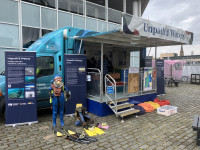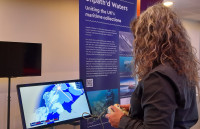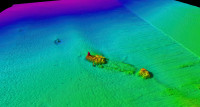Tuesday, January 14 2025
Over the course of three years (2022-24), the Unpath’d Waters research project delved deep into the UK’s maritime heritage collections, connecting, reimagining and presenting them using the latest technologies available in the heritage sector. The project was part of the Towards a National Collection (TaNC) programme, funded by UKRI’s Arts and Humanities Research Council.

Aiming to increase interaction with the UK’s maritime heritage, the project brought together more than 25 partner organisations, including museums, archives, and universities. Each partner contributed with expertise or sharing data from collections in their care.
Unpath’d Waters investigated the links between different collections and developed digital solutions to facilitate access to records by researchers and the public. At the same time, ways to bring heritage to life were explored, to reach those audiences that are not usually thought about in maritime heritage.
See our webpage for links to the online resources created by Unpath’d Waters.
Among the major outcomes of the project, a comprehensive Maritime Portal has been made available online, aggregating more than 100,000 records, from archive documents, to pictures, to archaeological survey data and reports, including sonar and multibeam. This is the first time that a national collection of maritime records has been achieved. The findings of Unpath’d Waters can point to where and how investment and additional research can help create the biggest impact.
Utilising a common vocabulary across these very different types of resources was a challenge in itself, but it proved to be a remarkably powerful tool to produce better and increased search results, and adaptable to AI tools. Experimenting with new AI capabilities has also provided interesting results, although there is still a need to better train models, and legacy heritage data presents interoperability and quality issues.
Of particular relevance to the work of the Heritage & Education Centre was the research undertaken by the Science and the Sea workstream. The team looked at how Unpath’d Waters could make shipwrecks more accessible and engaging to audiences. This was addressed bringing together an innovative mix of archive and digital resources, allowing the public to interact with submerged sites otherwise out of reach (See the Needles Voyager).
The team at Bangor University cross-referenced multibeam survey data and archival resources to review and identify shipwrecks in the Irish Sea. The digitised Lloyd’s Register of Ships and Ship Plans and Survey Reports collection were of great value to researchers as they provided quick and easy access to information without the need of physical in-person research.
Researcher Lara Band stated that the details from the plans of the SS Maja (ex Neva, ex Western Star) were key in proving that her shipwreck had been previously misidentified. “The Casualty Returns were also really useful for checking details, and the Lloyd's of London Missing Vessels Book gave a poignant, almost real time insight into the loss of the sailing Yacht Calista”, she adds.
Researcher Sarah Sanderson also used the HEC website as a base for her research. The website “was an invaluable resource and easy to use when searching the online register for ship plans, survey reports and documents. As the Casualty Return books and the Missing Vessel books are digitised this makes them convenient to access and easy to search by key words. It is useful that files can be downloaded easily from the website with no restriction.”
Unpath’d Waters extensively focussed on co-designing engagement content with different audiences, specifically the visually impaired, non-coastal communities, and researchers. Recommendations from these focus groups were integrated to resources from the very start, which proved to be a success as design data is now available for further use.
At the end of Unpath’d Waters, plenty of ideas and additional research were highlighted, to further develop data repositories and engagement content. With initiatives such as the Small Grants Scheme, Lloyd’s Register Foundation will provide further support to continue building on this excellent project.
All pictures in this blog are ©Unpath'd Waters.




